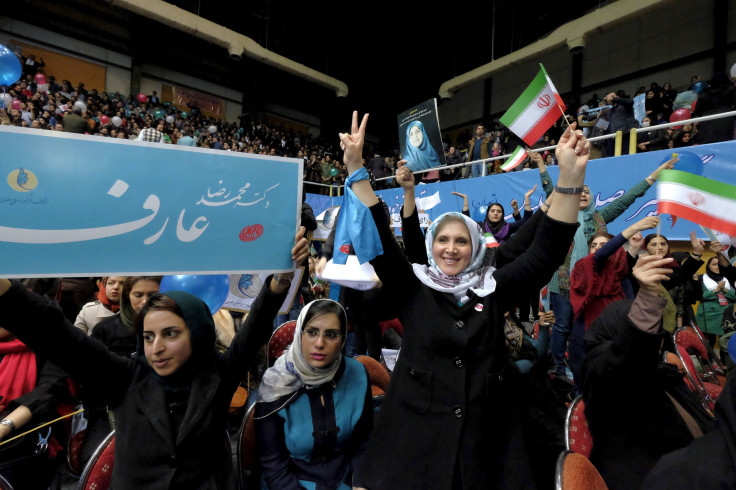Iran Elections 2016: A Guide To The Iranian Vote, Key Issues And Why It Matters

Iranians are preparing to head to the polls Friday, and although the country’s major presidential election is not until next year, the parliamentary elections come at a crucial point in Iran's history. The Islamic Republic recently signed a nuclear agreement with the U.S. and five other world powers, despite bitter disagreement from hard-liners in Iran. The deal has yet to yield its promised benefits, as the country is in recession, so Friday's vote may be the first measurement of whether Iranians remain optimistic following the agreement.
While it's true that Iran has a theocratic regime in which rights are severely restricted, there are genuine political divides within the country. Analysts generally agree that a lot is on the line with the upcoming vote. The elections are not just for seats in Parliament — called the Majles — but also a council that chooses the ayatollah, the highest figure in the country.
"No matter how undemocratic and how compromised the system is, there’s no questions the elections matter," Hooman Majd, an Iran analyst, told the Washington Post. "They matter in terms of who comes to power, who wields it and how much they can wield."
How truly meaningful are Iran's upcoming elections? https://t.co/3kN6iClp3F pic.twitter.com/ntXUlosISF
— The Atlantic (@TheAtlantic) February 23, 2016
Why are the Parliamentary Elections Important?
Since President Hassan Rouhani signed the nuclear deal last July, the struggle between moderates and conservatives has intensified. There are no established political parties in the country, but the 290 members of Parliament generally break into two blocs: those supporting a moderate agenda, which includes opening up to the West, and those who take more hard-line stances. New legislation must pass through the Parliament, so in order for Rouhani to continue reforms, he needs a one willing to cooperate.
The current Parliament sits on the more conservative end of the spectrum, but many have proved they are willing to compromise with Rouhani's agenda. Rouhani, himself a moderate conservative, managed to pull enough support from the Parliament to push forward the landmark nuclear deal. That's thanks in part to an election in 2013 that saw the ascension of more-moderate politicians. But hard-liners continue to hold sway, and amid contentious debates, they're hoping to get their power back.
What's the Big Issue?
For some Iranians, the major concerns involve social change and relations with the West — which Americans and Europeans are used to hearing about in Iran. But for most Iranians, the economy is likely to be the major issue.
Iran has experienced massive inflation in recent years due to international sanctions that have crippled the economy. Although sanction relief as part of the nuclear agreement has promised greater financial opportunity, it hasn't materialized much yet. And that's bad news for moderates, given that Rouhani sold the nuclear deal largely on its economic prospects.
Western governments have sought to take advantage of the deal, and in January, Rouhani led a delegation of 120 entrepreneurs and officials to Europe in hopes of signing major business deals. While multibillion-dollar arrangements were agreed to, the impact has yet to be felt on the Iranian streets, especially as the country's oil enters an oversaturated market.
What’s the Assembly of Experts?
Iran has a partially democratic system, but the ayatollah has overarching powers. The Assembly of Experts chooses the ayatollah, so they actually have one of the most important jobs in the country. There are 88 assembly seats, and each member sits for an eight-year term. There are currently 161 candidates. Given that Ayatollah Ali Khamenei is 76, there’s a good chance the candidates chosen this election could be responsible for picking the next supreme leader.
Khamenei himself has emphasized the importance of voting in recent days.
"As before, we insist everyone, even those who don't believe in the system and the leadership, come to the ballots, as the election belongs to the nation and the system," Khamenei said during a speech in Tehran, Vox reported. "That day when the current leader is not in this world, this committee should choose a leader who holds the key to the movement of this revolution."
Only nine women sit in Iran's parliament. But 586 women are running though. Will they make it? We'll know by Fri/Sathttps://t.co/bfHGH0kSBS
— Trita Parsi (@tparsi) February 23, 2016
Reformists have been circulating a list that includes moderate and liberal candidates, including Rouhani, himself a candidate for the assembly, and former President Mohammad Khatami, an icon of Iran's reformist movement, the Guardian reported. Another former president, Akbar Hashemi Rafsanjani, also a candidate for the assembly, has said that people need to get out and vote in order to prevent the society from turning toward "political and religious extremism."
Are the Elections Free and Fair?
Iranian election results have sparked bitter debates and mass protests, as reformists have often contested election results. There’s generally a sense that the Guardian Council of the Constitution, a body of conservative clerics and jurists tied to the supreme leader, has sought to shut out reformist candidates. The body vets all candidates and has disqualified a great deal of reformists and — perhaps alarmingly this cycle — even many moderate candidates. The mass disqualifications could signal that higher-ups, including the ayatollah, are fearful that Rouhani’s changes are happening too quickly.
Iran former President Khatami urges people to vote for the Reformist/Moderate coalition in upcoming elections. pic.twitter.com/kZJG34QbDf
— Negar نگار (@NegarMortazavi) February 21, 2016
So while it's true that Iran is not democratic, that does not mean political shifts do not matter. Iranian politicians compete for power and carry very different ideas for the country's future. Iran under Rouhani's leadership has looked drastically different than under the previous president, Mahmoud Ahmadinejad, whose government was seen to have greatly strained relations with the West.
© Copyright IBTimes 2024. All rights reserved.




















